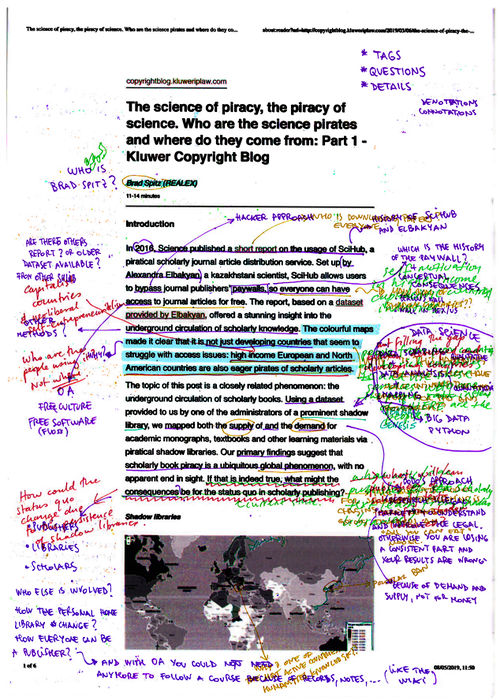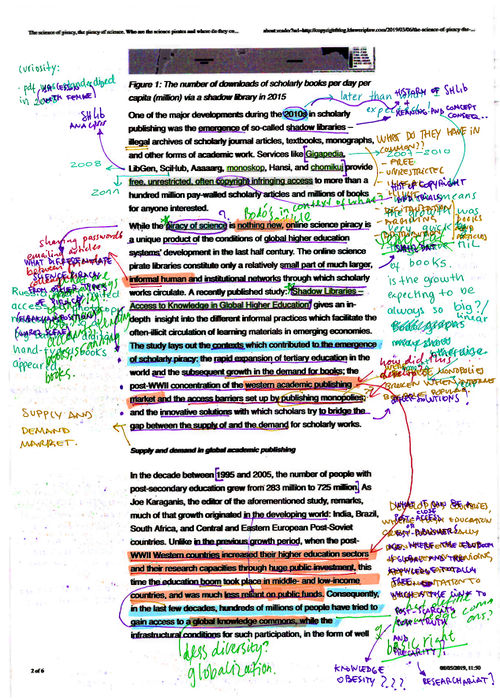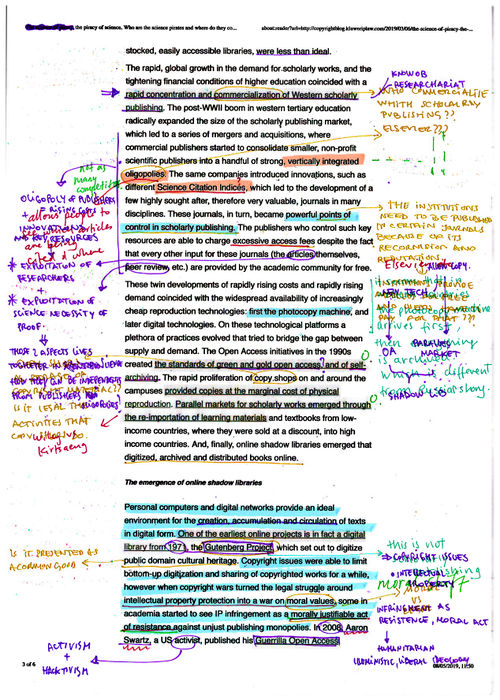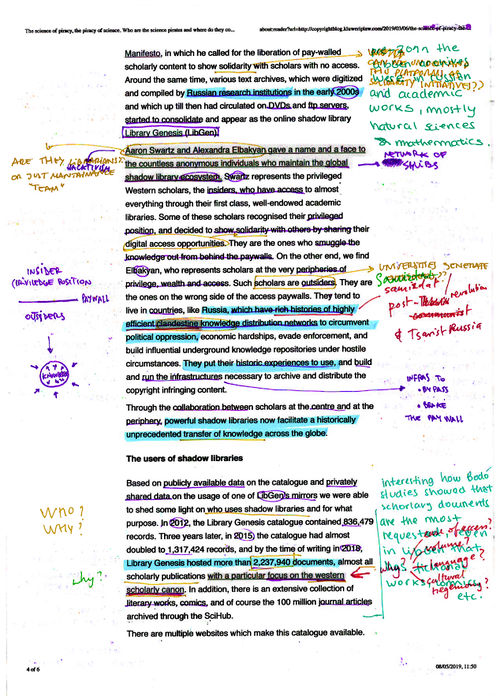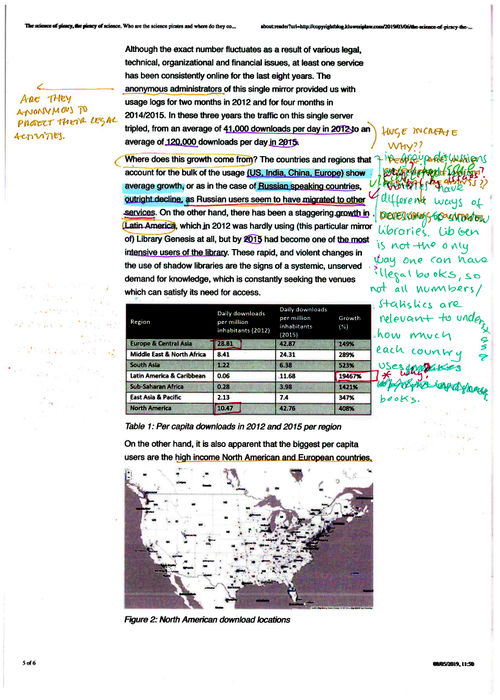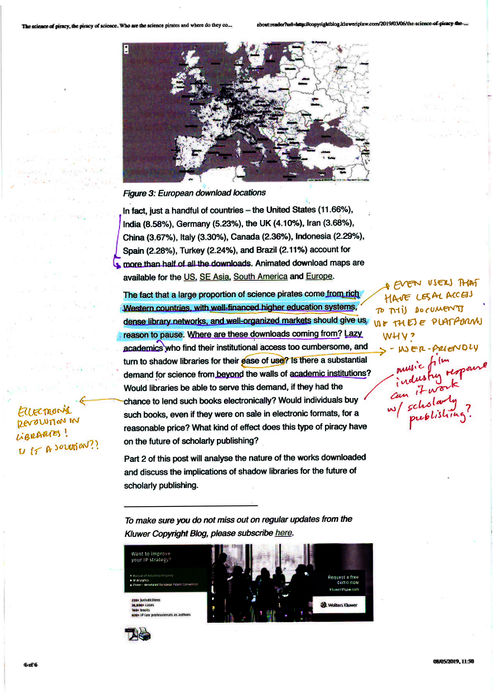User:Zpalomagar/RW&RM 3
THE LIBRARY IS OPEN
General Intro
Rotterdam, 3 July 2019
Dear readers,
In the spring and summer of 2019 we developed The Library Is Open, a publication which focuses on the operations, actions, and roles of legal and extra-legal libraries. Central to this project is the community that forms around a collection of texts – the custodians of the collection and the readers.
The Library Is Open is the result of the third iteration of Interfacing the Law, an ongoing research project between XPUB and Constant (BE), which explores issues around extra-legal libraries, software and legal interfaces and intellectual property. Led by our guest editor Femke Snelting, we participated in many activities which were organised by invited guests:
With Bodó Balázs, an economist and researcher on shadow libraries, we analysed the gargantuan dataset of Library Genesis, to determine trends which indicate access to texts and the social, geo-political and economic aspects at play
.
With Anita Burato and Martino Morandi at the Rietveld Library in Amsterdam, we discovered the subjectivity of subjects and thorny issues of classification and representation
.
With other readers, we deepened our understandings of texts through collective annotations.
With artist and researcher Eva Weinmayr, who introduced us to The Piracy Project, we examined the possible motivations and differences between pirated books and their "source".
With open-source software such as Tesseract, pdftk, and LibreOffice (and many others) we explored the technical processes used during the creation of pirate libraries, and the hidden labour involved in this.
With fellow pirates, we considered the multiplicity of roles and activities involved in maintaining various libraries, such as Monoskop, Libgen, Aaaaaarg, Sci-Hub, Memory of the World, Project Gutenberg, +++.
With Dušan Barok, the administrator of Monoskop and an alumnus of the Piet Zwart Institute, we discovered how Monoskop was initiated and how it has changed over time.
The variety of our collective sessions, and the practical exercises we performed led us to organise an afternoon of three workshops that directly address the active role of piracy, rather than simply talking about it. Encouraging small, informal, collective actions, we wanted to challenge the ordinary, hierarchical presentation of research projects in the academic context, and individual notions of authorship.
When choosing a suitable venue for our event, we decided to ask Leeszaal (in Dutch "Reading Hall") to host our workshops. Situated in a busy, multicultural area of Rotterdam, Leeszaal exemplifies many values we sympathise with, particularly open access to knowledge, and a focus on the community that uses the space, not just for reading but for many other social purposes. These values we recognise (somewhat nostalgically) as reminiscent of public libraries of yesteryear. However, the landscape today is quite different, with huge online commercial repositories of texts (e.g. JSTOR), protected by paywalls which limit access to them, and in response the emergence of "shadow libraries".
In the following pages we invite you to wander through the dilemmas, outcomes and reflections that came out of our three different workshops, and interviews with people whose work is at the centre of the issues that each workshop uncovers.
Knowledge In Action explores the roles and activities within libraries, such as selection and inclusion of books. Interview with: Dubravka Sekulić & Leeszaal staff.
Blurry Boundaries reveals the hidden processes and labour between the publishing and distribution of physical and digital books. Interview with: Dušan Barok.
Marginal Conversations highlights the sociality of texts, and how they can become conversations through collective reading, annotation and performance. Interview with: Marcell Mars & Tomislav Medak.
Yours in piracy, XPUB
MARGINAL CONVERSATIONS
Intro
Marginal Conversations is a workshop which explores collective reading, annotating and performing texts. We read, and write notes in the margins; usually in private, isolated from other readers. We come across texts with others' notes on them; the author unknown, their thoughts obscure. What happens when we share our notes, vocalise and perform them?
In this workshop, participants read, annotate and discuss the open letter "In Solidarity with Library Genesis and Sci-Hub", which asks for pirate library practices to come out from the shadows. This letter was selected for many reasons; it was an introduction for us to the thematic "Interfacing the Law", it's available in many languages, and presents an argument that generates interesting conversations. We compare annotations to detect common areas of interest and to also explore different methods, where readers can develop codes and techniques to extend the content of the source and express their personal understanding of it. The goal is not only to find areas of agreement, but also to discover tensions, disagreements etc. with the letter, which can also develop into fruitful conversations.
We leave traces of our reading, enriched by our doubts, sympathies, tensions and diverse understandings. We personalise the text, opening it up for collective conversations. Our voices occupy the space and leave traces on the text and in the library.
Workshop structure
Introduction
First of all, we have a quick round to introduce ourselves and share some thoughts around pirate/shadow libraries.
This workshop is divided in 3 parts:
Part 1: Reading && annotating
Part 2: Creating “heatmaps” && discussing through annotations
Part 3: Performative reading and recording
Why annotate together?
We see annotations as a way to express our understandings, questions, comments, disagreements, tensions and positions about what we read.
We aim to form collective understandings of this text and open up conversations about its theme; shadow libraries and piracy practices.
We explore ways in which texts can become conversations through collectively reading aloud and performing our annotations.
Part 1: Reading && annotating
— Organisation: Individual
— Materials: Annotation packs, containing: a) an A3 printout of the open letter “In Solidarity with Library Genesis and Sci-Hub” in English, b) an A3 sheet of carbon paper, c) an A3 sheet of tracing paper, and four-colour ballpoint pens
— Supplementary Materials: A4 printouts of the open letter “In Solidarity with Library Genesis and Sci-Hub”, in languages other than English (Bulgarian, Belarusian, Dutch, German, Spanish, French, Hindi, Hungarian, Italian, Mandarin, Portuguese, Romanian, Russian, Slovakian, Croatian, Ukranian)
Steps:
1. Provide the annotation packs.
2. If needed, provide the text in languages other than English to support our reading.
3. Each participant reads the text individually.
4. Each participant annotates the text on their annotation pack.
How can texts be extended?
The provided tools provide possibilities for participants to create diverse codes and levels of expression.
We don’t see this text as a sacred document. Our aim is to extend its content and enrich it with our collective questions, doubts, agreements, disagreements, points for conversations.
Part 2: Creating “heatmaps” && discussing through annotations
— Organisation: Groups of 2-3
— Materials: Same as Part 1
Steps:
1. Divide in groups of 2-3 people.
2. In our groups, compare our annotations and discuss the text. What was interesting? Did we make sense? Are there specific parts we want to discuss?
3. Create a “heatmap” of the text by placing tracing papers with annotations on top of each other, comparing which areas are annotated, how and why.
4. Each group selects parts of the text to read aloud and perform in Part 3.
What positions can be accomodated?
We collectively develop strategies to “amplify” specific parts of the text that we want to comment on, for diverse reasons, not only agreement.
We invite a plurality of positions and strategies; doubts, queries, tensions, suggestions, additions, experimentations, +++
Part 3: Performative reading && recording
— Organisations: All together
— Materials: Annotated “In Support of Library Genesis & Sci-Hub” letter, audio recording device, speakers
Steps:
1. Work with the paragraphs selected in the previous part.
2. Read aloud the text in turns (changing at every sentence).
3. Record!
4. Play the recordings from small speakers in the space of the library.
Why record our performed annotations?
We perform the text and our annotations in ways that show our positions and understandings. When we have an annotation, we do or say something (e.g. interrupt, raise our hands, make a noise, use an accent, use intonation to convey emotion etc).
The text becomes a “play”, a performance. We want to activate the text, by transforming it into a conversation through spoken annotation. The recording exists as a trace of our voices and bodies, with their expressive qualities, movements and sounds.
ANNOTATIONS
Can collaborative annotations make a text more efficient?
Researching annotations: digital vs physical. What about parts of texts that are under-annotated? 'if we don't find a reason to keep sth, let's remove it'. (what is not annotated can go away) Efficient/smart documents ... to make libraries less overwhelming. 25% reduction! An optimised library, is still a library! Let's not be shy about keeping the originals; an optimal library can be something different; this version is not about preservation. Annotation as thermometer for relevance. This library will be efficient, practical, time-saving, economical, minimalist, economical etc. Self-efficient.
Questions
- What about other attempts? (cliff-notes, summary algo's, ...)
- What about defining relevance by use -- politically? Who can define what is relevant and what content should go away? Is it a collaborative process? Why do you want to keep this information?
- What about the bootstrapping issue? The Unknown Unknown, Mark Forsyth
What collection of materials would be best for you to annotate?
For people in the future who have interest towards XPUB program. A collection of past readings are gathered on Git.
Because of the volume of the documents and time restraint, we develop mainly on annotation strategies, rather than aiming to annotate all the contents.
What purpose does annotation serve (in your case)?
Paloma: Find reasons to keep this part of the text. If you don't annotate it, you don't have a reason, you can remove it (under-annotated parts). Optimize texts through annotations reducing them to relevant pieces. Different levels of annotation can establish diverese relevance levels and could be translated into more or less efficient reduction models. Let's make practical/efficient/time-saving/economical/minimalist and smart documents reducing overwhelming pirate libraries to the essential part.
What does it do for the reader (in your case)?
Paloma: Optimise the document. Reduce it to the essential part based on the strength of the annotations that annotators have defined. Transform the source into an economical, time-saving document (in terms of length and weight).
What does it do for the annotators (in your case)?
Paloma: The annotators ( who are also readers) define reasons to keep the material in the essential part of the test. As an annotator you have the capacity to determine the relevance of the content ( levels of annotations and hierarchies). When this annotation tool became collective the detection of relevance areas is more accurate and the document can be reduce optimally.
Tools for collective annotation (Pa)
4) look at your project descriptions and use them as a basis to make a plan
a) define your aim [see above]
b) what needs to be done?
c) make a timetable
d) what needs to be developed further?
e) who can help you? and how?
f) consider how you can organise your upcoming methods sessions (5 & 19 June) so they can help you realise your aim.
Shadow libraries & formats
Frame what is a shadow library and which ones are available right know .
General review of the files that we can download and how to approach them with their differences .
Explore possibilities .
Maybe our publication can be a manual to develop the workshop (Toolbook for annotation) that would allow to reproduce the workshop in the future. (Instructions to share this knowledge)
Annotation session together, discussing the different strategies that people use to annotate .
Introduction to our tool collection
Is it moral to annotate/edit/modify a text?
aim?
Experiment with annotation systems to understand the whole process of annotate a document: Where can you obtain it?, how can you download it?, how can you annotate it?, which are the outcomes for a annotated document? Is is possible to create an annotated alternative library? .Be able to answer these questions at the end of the session and repeat the process on your own.
new knowledge?
How to obtain content from a shadow library, Why people annotate documents? (self-annotation vs collective annotation-rules/codes-) , Different approaches to annotation tools, annotated outcomes
role of annotation?
How to transform a document through annotation. Make a better document for you.
Which values are you adding when you are annotating?
Shadow libraries are overwhelming, they have more content that we can process. Why don’t we try to make it smaller and efficient for you? Annotation systems help us to clasify the material that we are reading defining which content is relevant for us and why. I understand document annotation as a tool to find reasons why you want ton keep this part of the text. If you don’t have a reason to keep something, let’s remove it. We can use collaborative annotation as a thermometer for content relevance in order to define which material is useful for readers and which is go unnnoticed. Let's make practical/efficient/time-saving/economical/minimalist and smart annotation tool.
Possible publication about the workshop - collection of annotation practical examples
Test or experiment different strategies to annotate a text in a collaborative way and how is the outcome for that.
Finish the workshop with a collection of outcomes of annotated texts that follow our proposals or researchs.
Maybe the same text/documents with different annotation outcomes??
COLLECTIVE ANNOTATED ARTICLE
SHADOW LIBRARIES (Paloma,Biyi & Pedro)
BIBLIOTECHA https://bibliotecha.info/
Info
Content: What is in the library? How much? Books. Depends on the community's contribution.
Users: Who is using / uploading / downloading? A community of users contribute, share amongst each other.
Catalog: What is the system? How is it organised? How about its ontology? The system revolves around a close knitted community under the same wifi hotspot. The physical proximity allows small community that provides protected safe spaces for sharing. Catalog in literal sense: There is a index.html page that shows files uploaded.
Infrastructure: What are technical specs? Software? Hardware? "It relies on a microcomputer running open-source software to serve books over a local wifi hotspot. Using the browser to connect to the library one can retrieve or donate texts." from https://bibliotecha.info/
Politics: What is the attitude? To encourage small communities form and share their own collections.
Economy: Sponsors? Donation? Advertising? It is part of Piet Zwart Insitute's Networked Media course project. Bibliotecha was invited to host workshops to set up the Bibliothecha; there is a workshop fee. There are no advertising.
Law: How does it interface? It interface with law that deals with sharing copyrighted content in non-public, priviate situations.
THE PIRATEBAY WORM https://thepiratebay.worm.org/
Abstract
The Pirate Bay is a digital and physical avant-garde media library in which you can find more than 6500 items including zines, books, CDs and DVDs. The users can access this library using two different paths. On the one hand the digital library is available online (http://thepiratebay.worm.org ) . Here you can find an extensive list of items that are available and you can obtain an identifier and description in order to facilitate the search process. Some of these items are directly available online so you can find a link to the content under the "relation" label (The Pirate Bay never offers you the files directly). On the other hand you can use the physical library placed in Worm-Rotterdam that you can visit in pre-defined time slots (Every Wednesday till Friday from 20.00-23.00 you can access ). The access to this library is free and it's promoted under the slogan "downloads are boring and passé" encouraging users to have a physical approach to the items that they are interested in.
This library is based on a "do it yourself" attitude. You can visit the physical storage and photocophy zines or books, digitise the VHS tapes or burn CDs or DVDs and everything for free. Worm Pirate Bay library is not just a place to copy paste it's also a space to enjoy. Promoted under the name: THE DISPLAY, this area allows you reading, watching, listening and sleeping inside this soft, pink womb. Pirate Bay library believes that "everything is for everyone", and "copyright is the biggest killer of creativity" so this library is publishing all this content defending that its latest goal is a global and common interest.
Info
Content: What is in the library? How much? - zines, books, CDs, DVDs - 6500items
Users: Who is using / uploading / downloading?Every Wednesday till Friday from 20.00-23.00 you can access – for FREE – WORM’s entire collection of avant-garde media. - "downloads are boring and passé" | Who is uploading? Just WORM?
Catalog: What is the system? How is it organised? How about its ontology?You can see what we have in store online, but we also run a physical lending policy
Infrastructure: What are technical specs? Software? Hardware? - "You can burn DVDs, digitise the VHS tapes, and copy books and magazines using our photocopier. " The DISPLAY facilitates your reading, watching, listening and sleeping inside this soft, pink womb; whilst being on display to other visitors.
Politics: What is the attitude? "And yes, it’s free of cost, you cheapskates!" - You can do that yourself - We believe that everything is for everyone, and copyright is the biggest killer of creativity
Economy: Sponsors? Donation? Advertising?No advertising | WORM financiation? | PZI as sponsor
Law: How does it interface? They list content and provides you a direct link to it but you can not download the file from its website - is it legal? unregulated? ilegal?
LIBRARY GENESIS http://gen.lib.rus.ec/
Abstract
Library Genesis is a digital library with a catalog of more than 25 million documents. The website owners describe themselves as “random book collectors”, which means they don’t accept requests or focus on curating materials. The topics are broad: from business, economy, and geology to housekeeping and leisure. The dimension of this library is enormous, there are even several copies of the same books. The content is mostly written material. Although this huge library seems to take information without any specific methodology, the reasons don’t seem completely apolitical. The main page of the website links to a letter of solidarity with strong opinions on sharing materials, copyright, moral values, etc. All people are encouraged to upload content and to download it too. There’s no score to maintain, log-in necessary, or price to pay. The desire of the platform to exist is well seen in the possibility of downloading all content, accessing the database and making mirrors.
Questions
What could be the motivation to make such a library? What is the message they might be trying to spread?
The scale, the amount of data provided in a library is directly related to the energy and time needed to provide them.
How is responsibility distributed ?
How are shadow libraries of different scales and purposes interconnected?
Are shadow libraries interconnected to each other, even if they have different scales and purposes, because what they have in common is that they brake the law (so they are vulnerable)?
flag of convenience
Do they have moral goals, or anarchist goals? Is an anarchist goal immoral (or moral)?
Symbolic gesture
Is it a solidarity gesture?
You can copy the website and mirror it. They don't claim ownership
Is there a heroic attitude of "liberating" knowledge? (robin hood style)
What values does it communicate?
Can these values be seen as coming from a particular cultural context (e.g. post-Communist, Eastern-bloc samzidat techniques)?
Is it moral to publish books which have a commercial goal?
Is the librarian replaced by a random algorithm?
Is there a librarian?
Who is responsible and what are they responsible for?
Non-curation can be a critical position; it is nort imposing a particular position.
Are they collecting material just because they can?
Yes! No filters;
Is this dissident activity?
They don't care a lot about the quality, everything is welcome. Duplicated material
Do they try to curate doubled material?
Why is it easier to support piracy for academic research than for recreational purposes?
Distinctions between "knowledge" and "information" / Democratic principle of sharing knowledge in the name of progress / Providing a benefit to society
What are the conditions of making something legitimate? (if we shift back to copyright - see also bootleg drugs,)
benefit for the greater good? is it based on profit?
What would be the first shadow library to be considered legitimate?
Why can't a fiction book (or anything besides articles) be considered research, culture, important to share, meaningful...?

